High heat is dangerous for chickens and measures must be taken by their caretakers to ensure their well-being, particularly when temperatures increase suddenly or exceed 85° F. Heat stroke, heat-induced stress and death can result when a chicken is overheated.
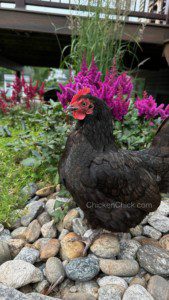
CHICKENS ARE NOT BUILT FOR HOT WEATHER
The normal body temperature of a chicken ranges between 104°-107°F, which it must regulate in hot weather without the benefit of sweat glands while wearing a down jacket! Chickens regulate their body temperature primarily by employing evaporative cooling techniques; body heat is lost through combs, wattles, legs, and droppings. When temperatures reach the mid 80s, a chicken will begin to pant, spread its wings away from its body, begin limiting its activity and reduce its feed intake.
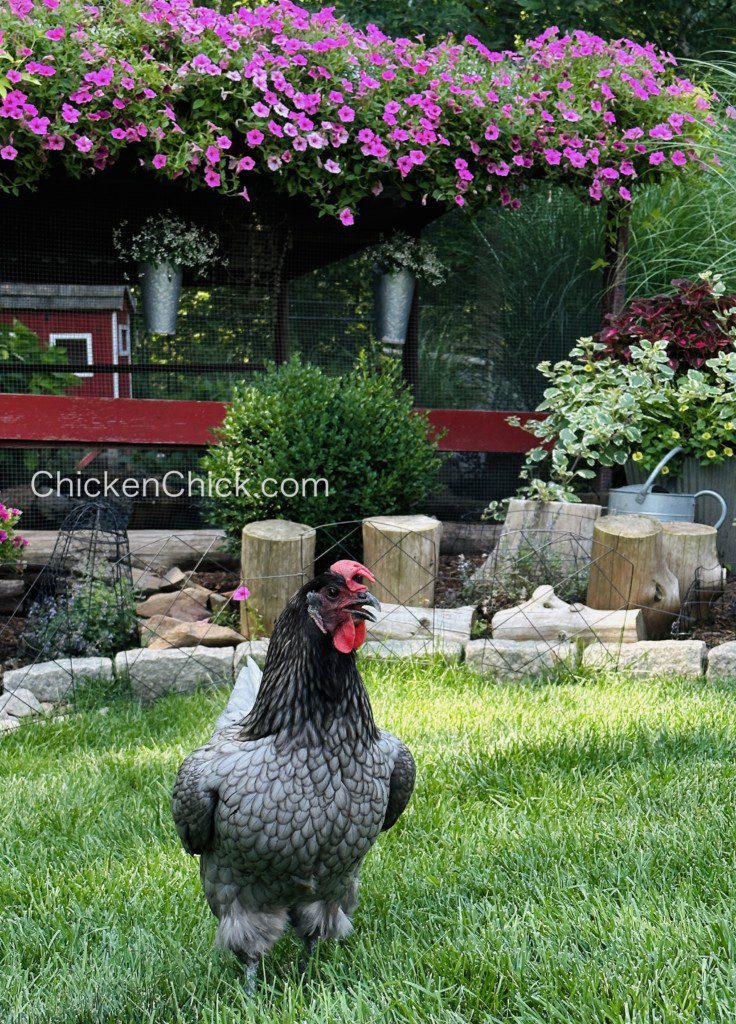
Marbella is panting and has her wings spread away from her body to facilitate temperature regulation in the heat.
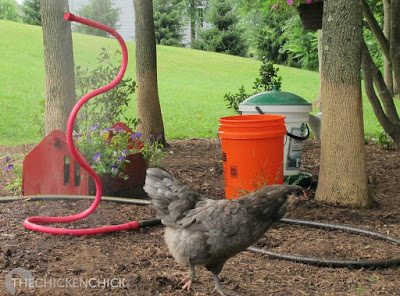
In temperatures over 90° F, keep a bucket or tub full of cool, water (not cold) near the flock at all times. If anyone begins to look overheated, panting, wings away from its sides, droopy, lethargic or pale in the wattles and comb, IMMEDIATELY submerge in the cool water up to its neck to bring its body temperature down. This simple measure can be lifesaving. Even if chickens are not in danger, this can be a welcome relief to chickens that would not voluntarily wade into water.
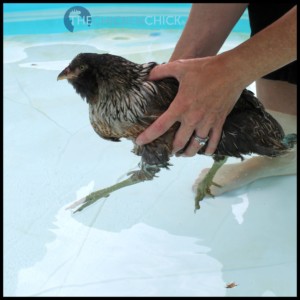
Emergency cooling of chicken in cool water. Be sure the water is not cold! Shock can result from reducing body heat too quickly.
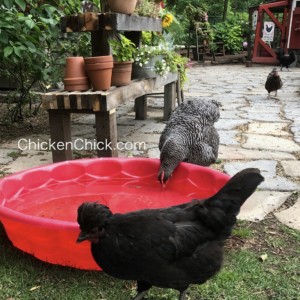
Some chickens may appreciate a kiddie wading pool to stand in to cool off, mine prefer drinking from it, which is fine, hydration is a critical step in staving off dehydration and maintaining body temperature.
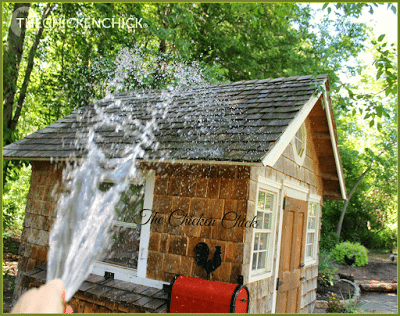
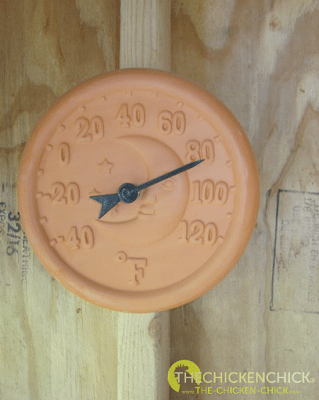
TWEAK RATIONS
Switch from layer feed (16% protein) to grower feed (18-20% protein). Since a chicken will eat less feed in the heat, providing laying hens with feed higher in protein will allow them to eat less overall volume while continuing to meet their daily nutritional needs. Laying hens should always be provided with oyster shell free-choice to ensure strong bones and eggshells, but oyster shells are even more important in hot weather when feed intake declines.
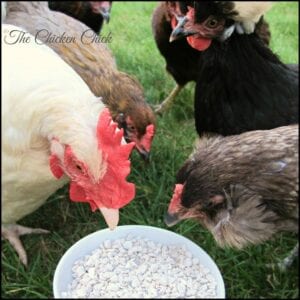
WATER, WATER EVERYWHERE
It is critical to provide clean, cool water to chickens in hot weather. Keep waterers in shady locations and supply additional water sources wherever possible. Bring the water TO THE CHICKENS. If they have a favorite, shady rest area during the day, place waterers near them. Chickens shouldn’t have to travel far to drink and will drink more if it is convenient to do so.
Refresh the water supply often throughout the day-chickens will not drink water that is as few as ten degrees warmer than their body temperature.
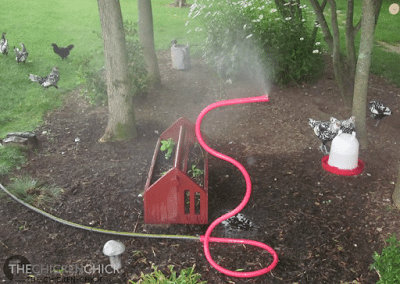
If possible, use a poultry nipple drinker to ensure a clean, fresh supply of water to chickens at all times. Add ice cubes or frozen water bottles to the poultry nipple drinker.

NOTE: Due to increased water intake on hot days, a chicken’s droppings can appear loose/watery/runny, which is completely normal. The passage of large amounts of water through the digestive tract is a method by which chickens cool themselves internally. Smart, right? This process is known as excretory heat transfer.
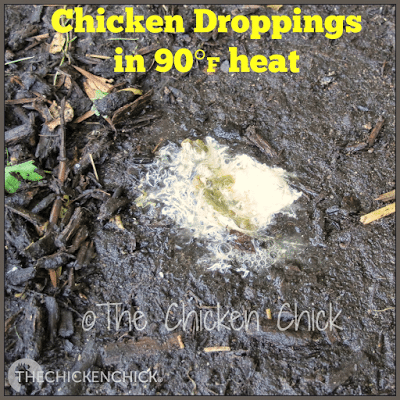
Provide a wading area with a kiddie pool, sled or shallow pan of water for chickens inclined to stand in it; mine won’t, but yours may! For chickens not partial to wading pools, flood areas of high-traffic so they must walk through it to get where they want to go.
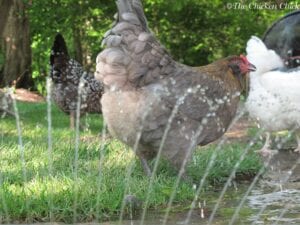
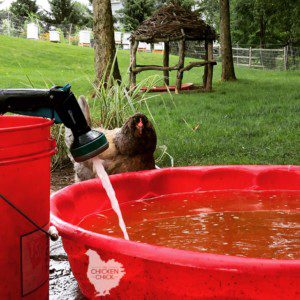
Kiddie pool for chickens to wade in or drink from.
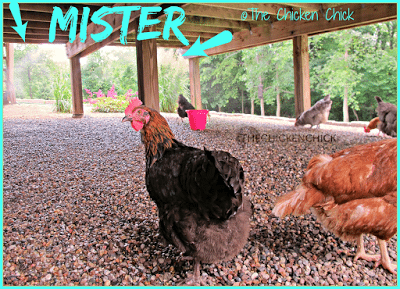
Use misters in shady areas. Misters work by “flash evaporation” to cool the air. The lower the humidity, the COOLER the air, the higher the humidity, the less relative cooling, but the air will still be COOLER in the misted area and the surrounding area than without a mister. You can expect a temperature drop of 10-20° F in 40-80% humidity with a mister in the chicken yard. Misters are not intended to get chickens wet! They are to cool the air around the chickens.
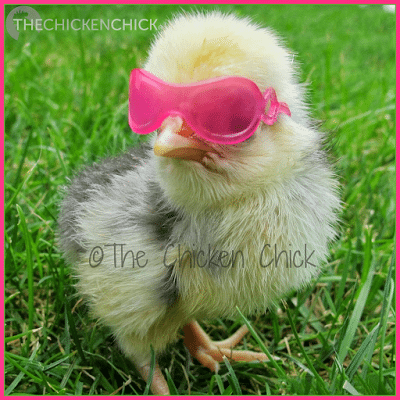
SHADE
over the run with a tarp, roof, shade cloth, umbrella, banana leaves- whatever you’ve got- to keep the sun from baking the ground. Provide additional shade wherever possible, by whatever means available. Plan landscaping to provide shaded areas around the chicken coop and run. Apply reflective film to coop windows.
These ornamental grasses provide shade and keep the ground cool for the chickens during the heat of the day. The grasses grow very quickly and the chickens neither eat them nor trample them. BONUS!

ICE, ICE BABY
Freeze various sizes of water bottles and jugs and add them to waterers throughout the day. Chickens will not drink water that is ten degrees warmer than their body temp.
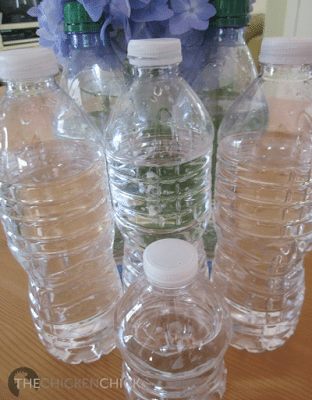
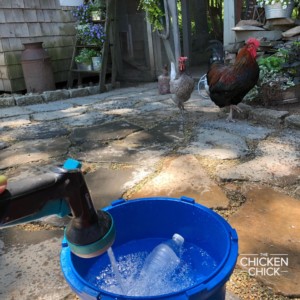
Bottles of ice keep water cold in hot weather
Place a large, plastic bucket or trash can on its side in a shady spot, adding frozen water bottles/jugs inside it for chickens to rest alongside. Freeze water in cake pans and place underneath stepping stones in the shade for the birds to lay on.
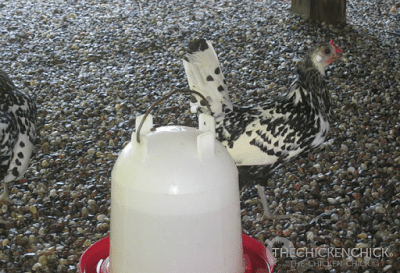
ELECTROLYTES FOR HEAT STRESS
Heat stress and dehydration deplete the chicken’s body of electrolytes required for normal body functioning, therefore replenishing them is a priority when chickens suffer from heat stress and/or dehydration. Offer electrolyte water to dehydrated chickens for no more than 6 hours per day, no more than a week’s time, supplying fresh, cold water for the remainder of the time.
ADVISORY: Electrolytes should not be given to healthy chickens who are not suffering from heat stress or dehydration.
Read about Hot Weather Electrolyte Ice consumption limitations and instructions here.
INCREASE AIRFLOW/CIRCULATION
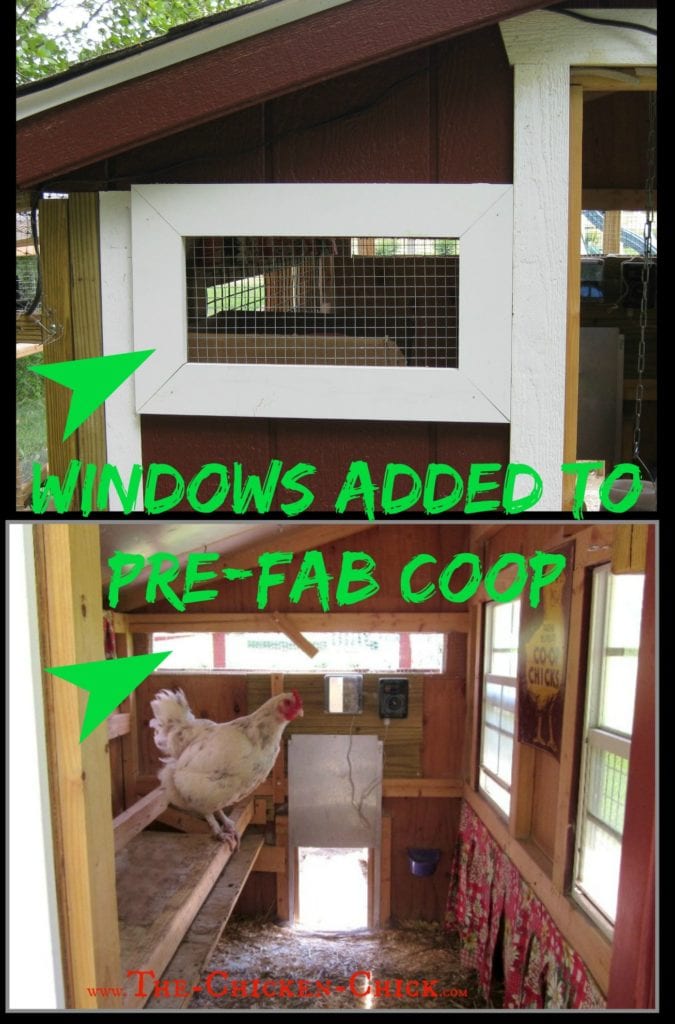
Ensure there are windows on all four sides of the coop! Chickens are not built for hot weather; they have a core body temperature of ~107°F, they wear down jackets, and have no sweat glands. Temperatures over 85°F are endanger their lives. Windows are not a coop luxury, they are a survival essential. If your coop does not have functioning windows on all four walls, create some with a reciprocating saw, hinges and predator-proof with hardware cloth secured by screws and washers.
During the day, prop open all coop doors and windows including the egg door, to promote airflow.
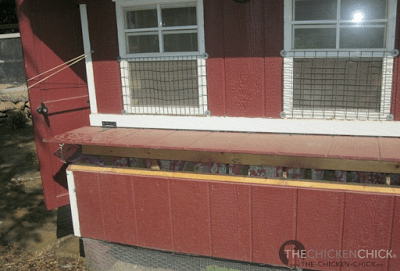
Add fans to the coop and run. Place a frozen jug of water between the fan and nest boxes during the day and between the fan and roosts at night.
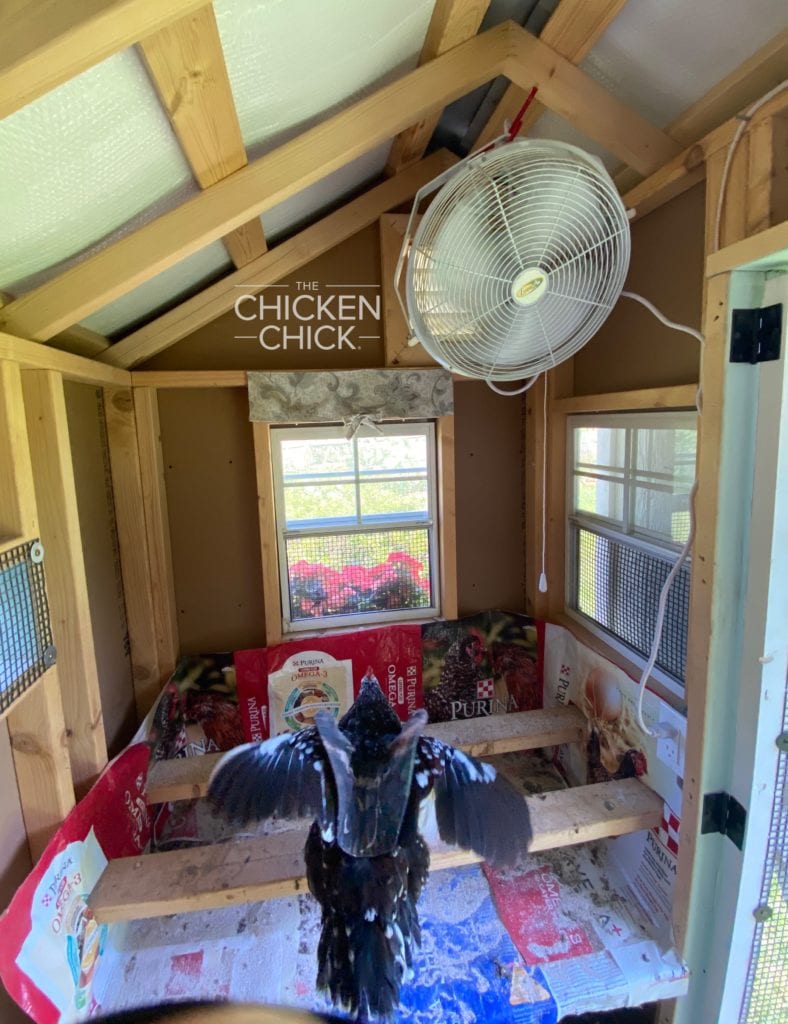
It’s important to use a fan intended for agricultural use in a chicken coop due to the high dust/dander conditions. This fan shown in my Chicken Chick Essential Coop™ is designed for INDOOR/OUTDOOR use with an enclosed motor, which means dust won’t kill it and you can hose it down to clean it.
If it is too hot in the nest boxes, BLOCK ACCESS TO THEM to prevent hens from using them. Set up temporary nest boxes in a cooler location in the coop, in the run or outside the run. A milk crate, cardboard box, large basket- anything you can think of that affords air flow and cooler temperatures can be used as a nest box in dangerously hot weather.
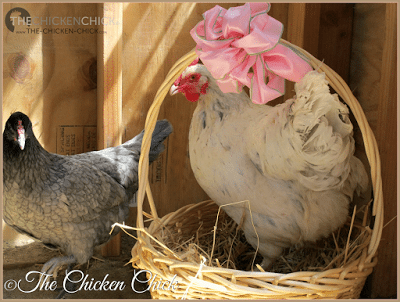
LITTER MANAGEMENT
If using the deep litter/built-up litter system, remove it and replace it with clean, shallow litter; pine shavings are fine, but sand is ideal.
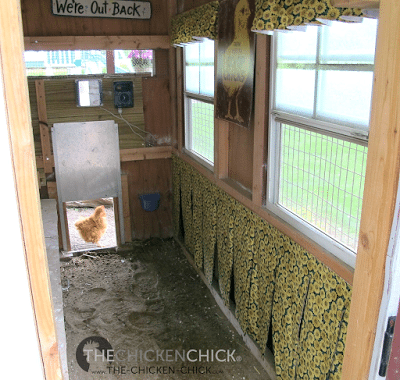
Use sand in the covered run- it stays cool and and provides ample opportunities for laying in dusting holes- another mechanism chickens use to cool themselves.
ABOUT TREATS
Avoid giving chickens treats when it’s hot outside so as not to promote increased internal body temperatures from digestion and increased physical activity. I used to offer my chickens frozen treats in hot weather, but I don’t anymore since I now understand it promotes increased body temperatures and that they need the nutrients in their feed, which they may not eat if they eat other foods.
A NOTE ABOUT CHICKENS & MINT
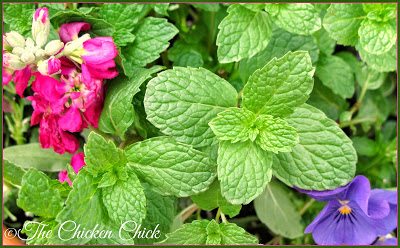
While we think of mint as refreshing in hot weather due to its flavor, mint does not have cooling properties nor the ability to lower a chicken’s body temperature. Not only does mint NOT reduce a chicken’s body temperature, they do not even perceive the minty flavor due to their extremely limited taste buds. Chickens have approximately 250 taste buds compared to humans with nearly 10,000. So, there’s certainly no harm in giving chickens fresh mint, but mint does not help lower a chicken’s body temperature and will not help them in any way. Read more about mint here.
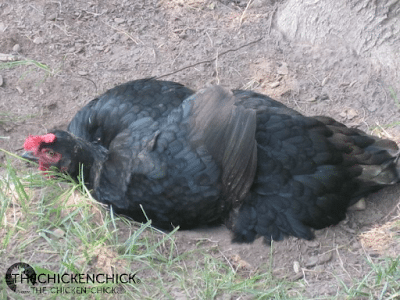
DUST BATH AREAS
Provide access to dust bathing areas in shady locations. Chickens cool themselves by digging down to cooler spots in the earth. Sand is an ideal dust bathing medium as it stays cool in the shade and requires no expenditure of excess energy by the chickens to dig up. Mulch and peat moss are also excellent choices for a dust bath medium.
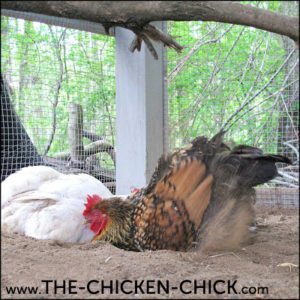
Chickens dust bathing in sand in the run.
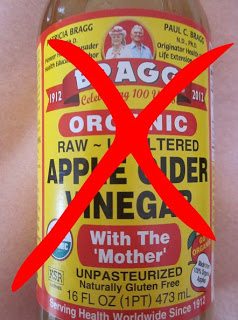
SKIP THE ACV
Vinegar should NOT be added to waterers particularly during times of high heat. I asked Dr. Mike Petrik, a laying hen veterinarian with a Master of Science degree in animal welfare, his opinion of vinegar in poultry waterers. In reply, Dr. Petrik wrote the following, which dictates AGAINST using ACV during high heat conditions:
“Acidified water affects laying hens by making the calcium in her feed a little less digestible(based on chemistry….calcium is a positive ion, and dissociates better in a more alkaline environment). Professional farmers regularly add baking soda to their feed when heat stress is expected….this maintains egg shell quality when hens’ feed consumption drops due to the heat.”
In summary, during high heat conditions, baking soda facilitates calcium absorption while ACV inhibits it. SKIP the ACV in the heat, opting for an electrolyte solution instead, OR in lieu of electrolytes, add 1/4 cup baking soda per gallon of water.
It’s not easy caring for chickens in the heat, but a little bit of planning and few, simple adjustments can make a big difference in their comfort level and their very ability to survive.
Kathy Shea Mormino
Affectionately known internationally as The Chicken Chick®, Kathy Shea Mormino shares a fun-loving, informative style to raising backyard chickens. …Read on


shop my SPONSORS
High heat is dangerous for chickens and measures must be taken by their caretakers to ensure their well-being, particularly when temperatures increase suddenly or exceed 85° F. Heat stroke, heat-induced stress and death can result when a chicken is overheated.

CHICKENS ARE NOT BUILT FOR HOT WEATHER
The normal body temperature of a chicken ranges between 104°-107°F, which it must regulate in hot weather without the benefit of sweat glands while wearing a down jacket! Chickens regulate their body temperature primarily by employing evaporative cooling techniques; body heat is lost through combs, wattles, legs, and droppings. When temperatures reach the mid 80s, a chicken will begin to pant, spread its wings away from its body, begin limiting its activity and reduce its feed intake.

Marbella is panting and has her wings spread away from her body to facilitate temperature regulation in the heat.

In temperatures over 90° F, keep a bucket or tub full of cool, water (not cold) near the flock at all times. If anyone begins to look overheated, panting, wings away from its sides, droopy, lethargic or pale in the wattles and comb, IMMEDIATELY submerge in the cool water up to its neck to bring its body temperature down. This simple measure can be lifesaving. Even if chickens are not in danger, this can be a welcome relief to chickens that would not voluntarily wade into water.

Emergency cooling of chicken in cool water. Be sure the water is not cold! Shock can result from reducing body heat too quickly.

Some chickens may appreciate a kiddie wading pool to stand in to cool off, mine prefer drinking from it, which is fine, hydration is a critical step in staving off dehydration and maintaining body temperature.


TWEAK RATIONS
Switch from layer feed (16% protein) to grower feed (18-20% protein). Since a chicken will eat less feed in the heat, providing laying hens with feed higher in protein will allow them to eat less overall volume while continuing to meet their daily nutritional needs. Laying hens should always be provided with oyster shell free-choice to ensure strong bones and eggshells, but oyster shells are even more important in hot weather when feed intake declines.

WATER, WATER EVERYWHERE
It is critical to provide clean, cool water to chickens in hot weather. Keep waterers in shady locations and supply additional water sources wherever possible. Bring the water TO THE CHICKENS. If they have a favorite, shady rest area during the day, place waterers near them. Chickens shouldn’t have to travel far to drink and will drink more if it is convenient to do so.
Refresh the water supply often throughout the day-chickens will not drink water that is as few as ten degrees warmer than their body temperature.

If possible, use a poultry nipple drinker to ensure a clean, fresh supply of water to chickens at all times. Add ice cubes or frozen water bottles to the poultry nipple drinker.

NOTE: Due to increased water intake on hot days, a chicken’s droppings can appear loose/watery/runny, which is completely normal. The passage of large amounts of water through the digestive tract is a method by which chickens cool themselves internally. Smart, right? This process is known as excretory heat transfer.

Provide a wading area with a kiddie pool, sled or shallow pan of water for chickens inclined to stand in it; mine won’t, but yours may! For chickens not partial to wading pools, flood areas of high-traffic so they must walk through it to get where they want to go.


Kiddie pool for chickens to wade in or drink from.

Use misters in shady areas. Misters work by “flash evaporation” to cool the air. The lower the humidity, the COOLER the air, the higher the humidity, the less relative cooling, but the air will still be COOLER in the misted area and the surrounding area than without a mister. You can expect a temperature drop of 10-20° F in 40-80% humidity with a mister in the chicken yard. Misters are not intended to get chickens wet! They are to cool the air around the chickens.

SHADE
over the run with a tarp, roof, shade cloth, umbrella, banana leaves- whatever you’ve got- to keep the sun from baking the ground. Provide additional shade wherever possible, by whatever means available. Plan landscaping to provide shaded areas around the chicken coop and run. Apply reflective film to coop windows.
These ornamental grasses provide shade and keep the ground cool for the chickens during the heat of the day. The grasses grow very quickly and the chickens neither eat them nor trample them. BONUS!

ICE, ICE BABY
Freeze various sizes of water bottles and jugs and add them to waterers throughout the day. Chickens will not drink water that is ten degrees warmer than their body temp.


Bottles of ice keep water cold in hot weather
Place a large, plastic bucket or trash can on its side in a shady spot, adding frozen water bottles/jugs inside it for chickens to rest alongside. Freeze water in cake pans and place underneath stepping stones in the shade for the birds to lay on.

ELECTROLYTES FOR HEAT STRESS
Heat stress and dehydration deplete the chicken’s body of electrolytes required for normal body functioning, therefore replenishing them is a priority when chickens suffer from heat stress and/or dehydration. Offer electrolyte water to dehydrated chickens for no more than 6 hours per day, no more than a week’s time, supplying fresh, cold water for the remainder of the time.
ADVISORY: Electrolytes should not be given to healthy chickens who are not suffering from heat stress or dehydration.
Read about Hot Weather Electrolyte Ice consumption limitations and instructions here.
INCREASE AIRFLOW/CIRCULATION

Ensure there are windows on all four sides of the coop! Chickens are not built for hot weather; they have a core body temperature of ~107°F, they wear down jackets, and have no sweat glands. Temperatures over 85°F are endanger their lives. Windows are not a coop luxury, they are a survival essential. If your coop does not have functioning windows on all four walls, create some with a reciprocating saw, hinges and predator-proof with hardware cloth secured by screws and washers.
During the day, prop open all coop doors and windows including the egg door, to promote airflow.

Add fans to the coop and run. Place a frozen jug of water between the fan and nest boxes during the day and between the fan and roosts at night.

It’s important to use a fan intended for agricultural use in a chicken coop due to the high dust/dander conditions. This fan shown in my Chicken Chick Essential Coop™ is designed for INDOOR/OUTDOOR use with an enclosed motor, which means dust won’t kill it and you can hose it down to clean it.
If it is too hot in the nest boxes, BLOCK ACCESS TO THEM to prevent hens from using them. Set up temporary nest boxes in a cooler location in the coop, in the run or outside the run. A milk crate, cardboard box, large basket- anything you can think of that affords air flow and cooler temperatures can be used as a nest box in dangerously hot weather.

LITTER MANAGEMENT
If using the deep litter/built-up litter system, remove it and replace it with clean, shallow litter; pine shavings are fine, but sand is ideal.

Use sand in the covered run- it stays cool and and provides ample opportunities for laying in dusting holes- another mechanism chickens use to cool themselves.
ABOUT TREATS
Avoid giving chickens treats when it’s hot outside so as not to promote increased internal body temperatures from digestion and increased physical activity. I used to offer my chickens frozen treats in hot weather, but I don’t anymore since I now understand it promotes increased body temperatures and that they need the nutrients in their feed, which they may not eat if they eat other foods.
A NOTE ABOUT CHICKENS & MINT

While we think of mint as refreshing in hot weather due to its flavor, mint does not have cooling properties nor the ability to lower a chicken’s body temperature. Not only does mint NOT reduce a chicken’s body temperature, they do not even perceive the minty flavor due to their extremely limited taste buds. Chickens have approximately 250 taste buds compared to humans with nearly 10,000. So, there’s certainly no harm in giving chickens fresh mint, but mint does not help lower a chicken’s body temperature and will not help them in any way. Read more about mint here.

DUST BATH AREAS
Provide access to dust bathing areas in shady locations. Chickens cool themselves by digging down to cooler spots in the earth. Sand is an ideal dust bathing medium as it stays cool in the shade and requires no expenditure of excess energy by the chickens to dig up. Mulch and peat moss are also excellent choices for a dust bath medium.

Chickens dust bathing in sand in the run.

SKIP THE ACV
Vinegar should NOT be added to waterers particularly during times of high heat. I asked Dr. Mike Petrik, a laying hen veterinarian with a Master of Science degree in animal welfare, his opinion of vinegar in poultry waterers. In reply, Dr. Petrik wrote the following, which dictates AGAINST using ACV during high heat conditions:
“Acidified water affects laying hens by making the calcium in her feed a little less digestible(based on chemistry….calcium is a positive ion, and dissociates better in a more alkaline environment). Professional farmers regularly add baking soda to their feed when heat stress is expected….this maintains egg shell quality when hens’ feed consumption drops due to the heat.”
In summary, during high heat conditions, baking soda facilitates calcium absorption while ACV inhibits it. SKIP the ACV in the heat, opting for an electrolyte solution instead, OR in lieu of electrolytes, add 1/4 cup baking soda per gallon of water.
It’s not easy caring for chickens in the heat, but a little bit of planning and few, simple adjustments can make a big difference in their comfort level and their very ability to survive.




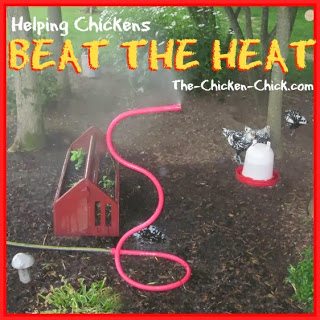
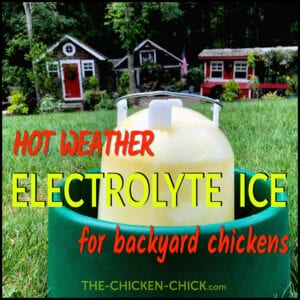







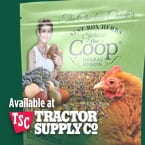

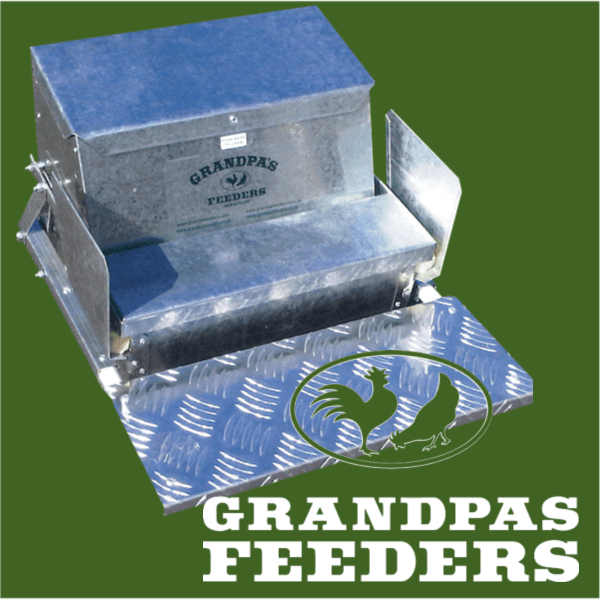






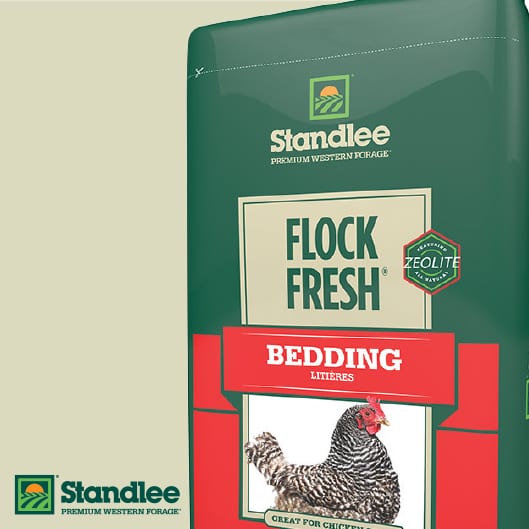
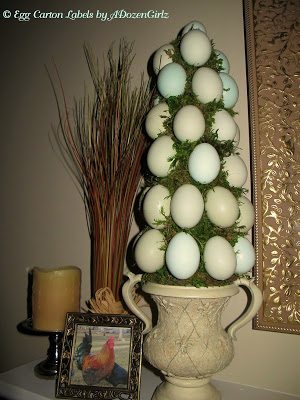

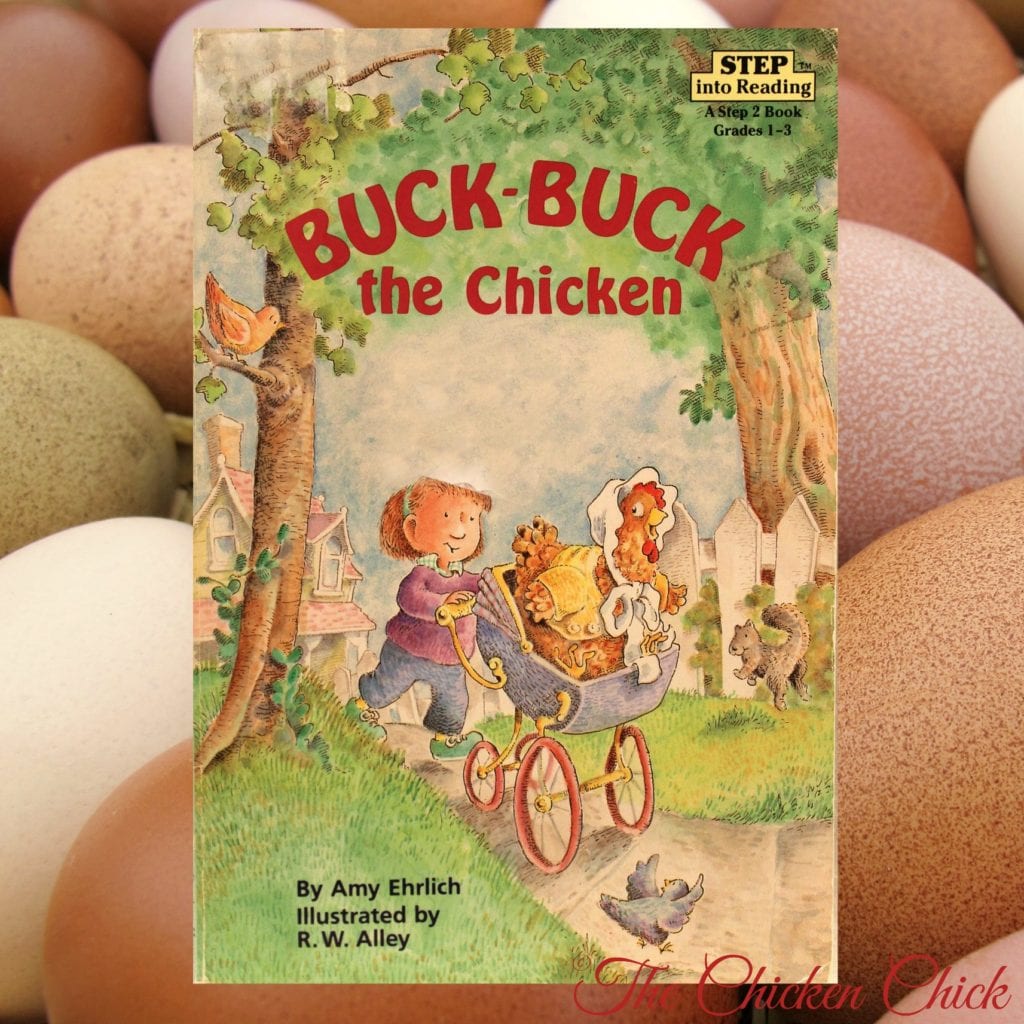













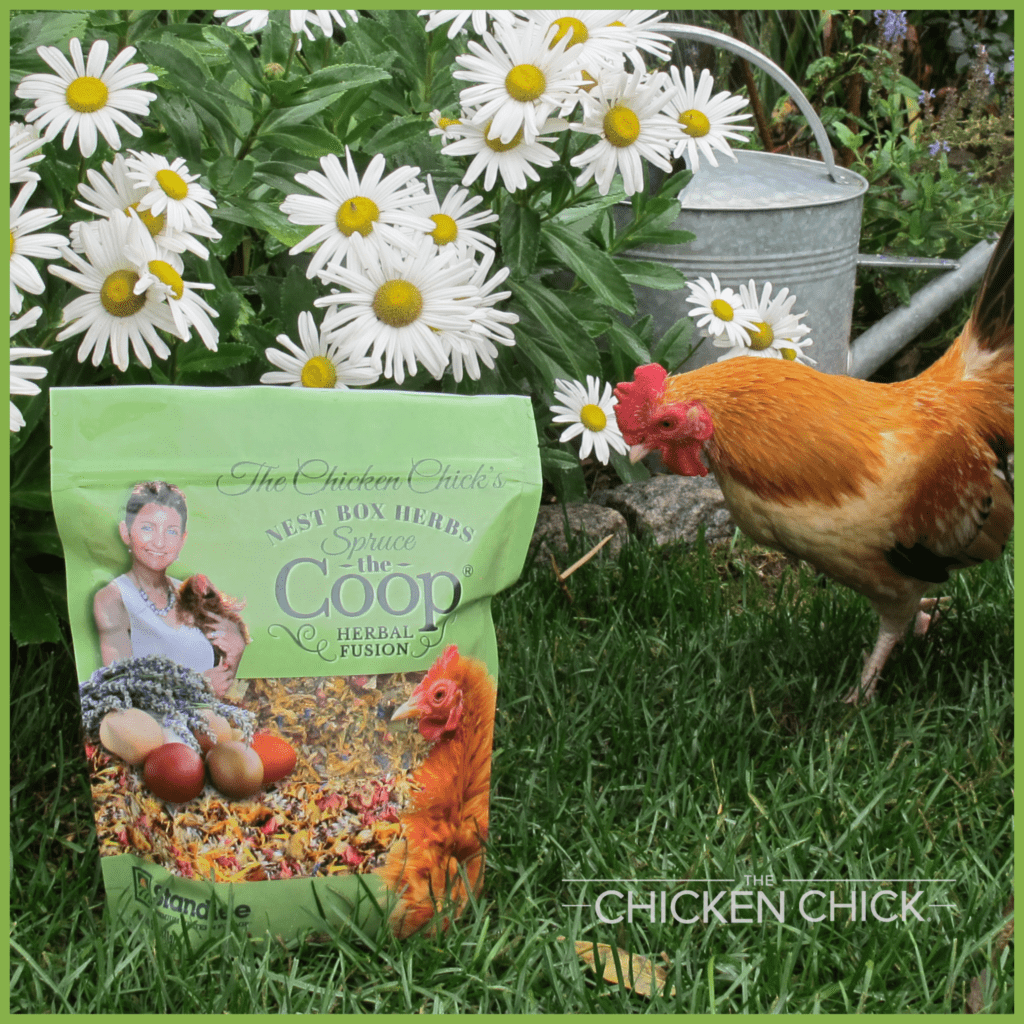

I’m so glad to see this information since we are in the midst of a extreme heat spell with upper 90’s with high humidity! Thank you!